That Yeshua was crucified just outside of Jerusalem on Passover/Pesach (Nisan 14) in 33 CE1 is widely accepted. What might be less clear is ‘why’. Was he simply at the wrong place at the wrong time? Getting what he deserved because of his subversive mission? Or was this the climax of the work of Hashem, planned from the beginning? If so, what did it accomplish? We look at this starting from the Torah, highlighting its emphasis on korbanot no longer practiced today.
Sacrifices in Torah
A striking feature of the Torah is its emphasis on blood sacrifices of animals. The Book of Leviticus goes into great detail about how the lambs, bulls and goats were to be offered as:
- Burnt offerings (Leviticus 1),
- Fellowship offerings (Leviticus 3),
- Sin offerings (Leviticus 4),
- Guilt offerings (Leviticus 5)
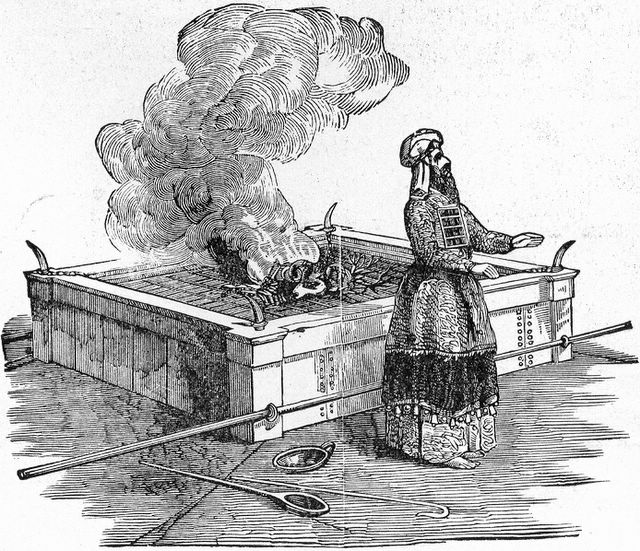
Wikipedia reports that according to the great Jewish sage Maimonides, about one hundred of the permanent 613 commandments based on the Torah directly concern these sacrifices. Thus 16% of Torah commands are effectively abolished today.
Known as a korban (קָרְבָּן, or qorban, corban), for each sacrifice the person bringing the sacrifice first placed his hands on the animal’s head. This symbolized the guilt of the person being transferred to the animal. Then, after being slaughtered, the ministering priest would sprinkle the slain animal’s blood on the various objects in the Tabernacle.
Sacrifices followed a specific schedule and could only be offered in the Tabernacle and then later on at the Temple.
This sacrificial system followed pivotal events recorded in the Torah where animal sacrifices also featured prominently, in particular:
- Sacrifice of a ram at the binding of Isaac (Yitzhak) on Mount Moriah (Genesis 22)
- Sacrifice of lambs at Passover/Pesach (Exodus 12).
Sin results in Death and Separation
The continually offered sacrifices illustrated to the nation the principle that the prophets Ezekiel and Isaiah spelled out explicitly:
The one who sins is the one who will die.
Ezekiel 18:4
But your iniquities have separated
Isaiah 59:2
you from your God;
your sins have hidden his face from you,
so that he will not hear.
The Brit Chadasha summarizes this as an active law at work:
For what one earns from sin is death…
Romans 6:23
Sin results in death and separation from G-d. In fact, “Death” literally means ‘separation’. When our soul separates from our body we die physically. Similarly we are even now separated from G-d spiritually. This is true because G-d is Holy (sinless) while we have become corrupted from our original creation and so we sin. The sacrificial system inaugurated by Moses (Moshe) in the Torah constantly reminded the Israelites of this truth.
G-d, speaking through Ezekiel, elaborated on this by invoking the image of a ‘gap’ between G-d and the people.
“I looked for someone among them who would build up the wall and stand before me in the gap on behalf of the land so I would not have to destroy it, but I found no one.
Ezekiel 22:30
We use the diagram below to illustrate this. It pictures G-d opposite from mankind with a gap between. Just like a branch cut from a tree is dead, so we have cut ourselves off from G-d and become spiritually dead.
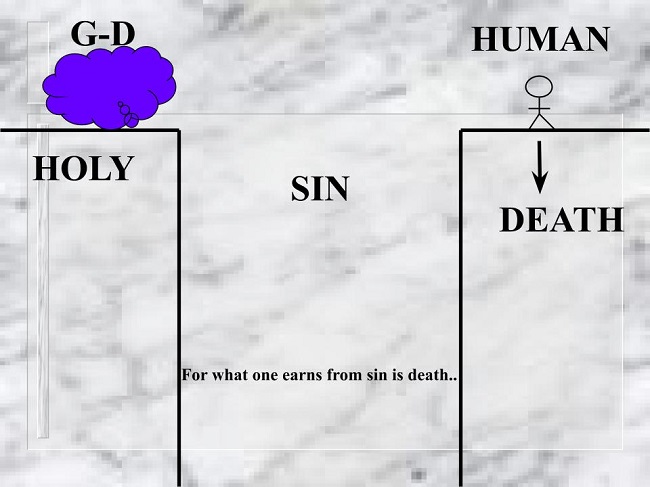
Merit from Law observance is insufficient
This separation causes guilt. So religiously what we try to do is build a bridge to take us from our side (of death) to G-d’s side. We do this in many different ways: being strictly observant, faithfully reciting the Amidah, ensuring minyan for all services, strictly eating kosher, following Sabbath (Shabbat) regulations, respecting halakha, simply being good, following the Ten Commandments, helping the poor, meditation, etc. Observant Jews as well as secular Jews have a myriad of traditions that they adopt to achieve this strategy. These efforts to gain merit can be very difficult – and living them out can be very complicated. The next figure illustrates this.
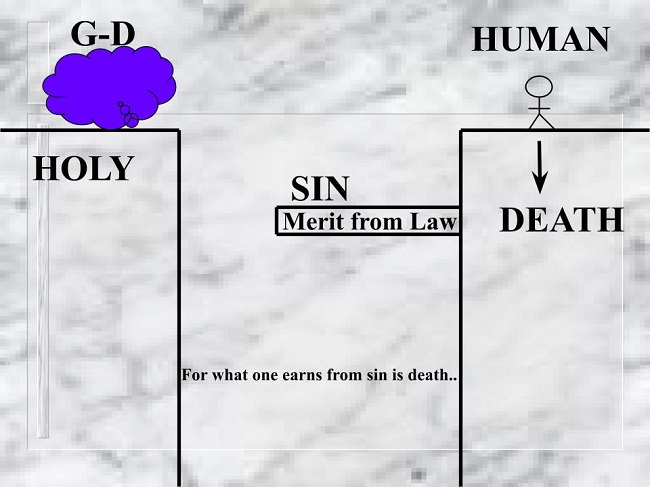
The problem is that our hard efforts, merits, and observances, though not wrong, are insufficient because the payment required (the ‘wages’) for our sins is ‘death’. The sacrifices, or korbanot, instituted in the Torah taught this sin-to-death principle. Our efforts are like a ‘bridge’ that tries to cross the gap separating us from G-d – but in the end cannot do it. This is because religious merit will not solve our root problem. It is like trying to heal cancer (which results in death) by eating vegetarian. Eating vegetarian is not bad, it may even be good – but it will not cure cancer. For cancer you need a totally different treatment.
This is Bad News. Therefore, we often do not even want to consider it and instead we fill our lives with activities and hope it will go away. But the Torah stresses this principle of sin and death in the sacrifices to turn our attention to focus on the cure that is simple and powerful. The Brit Chadasha does likewise.
For what one earns from sin is death; but …
Romans 6:23
Good News of Life
The small word ‘but’ shows that the direction of the message is about to change directions, to the Good News – the cure. It shows both the goodness and love of G-d.
For what one earns from sin is death; but eternal life is what one receives as a free gift from God, in union with the Messiah Yeshua, our Lord.
Romans 6:23
The good news of the gospel is that the sacrifice of Yeshua bridges this gap between us and G-d. We know this because three days after his death Yeshua rose bodily, coming alive again in a physical resurrection. There exists historic, compelling evidence for this. Avraham/Abraham’s sacrifice and the Passover (Pesach) sacrifice prophetically acted out Yeshua’s coming sacrifice and resurrection. Like the Israelite giving korban could go free as the goat died, we are free of sin’s penalty of death from Yeshua’s sacrifice. G-d planned these signs in the Torah pointing to Yeshua to help us accept His cure.
Yeshua was a human who lived a sinless life. Therefore he can ‘touch’ both the human and the G-d sides and span the gap separating G-d and people. He is a Bridge to Life which the diagram illustrates.
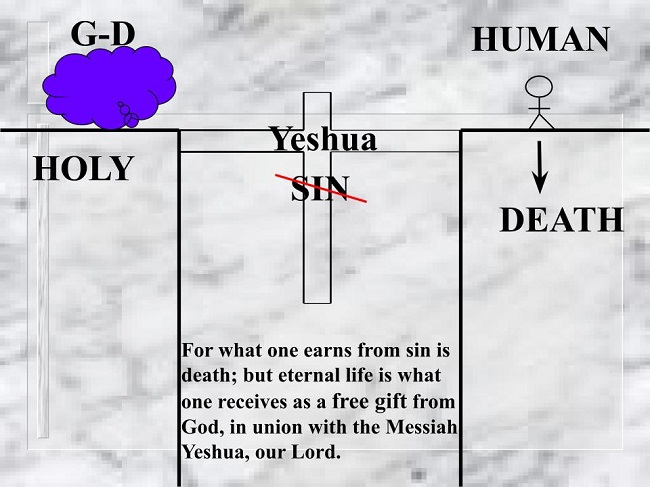
Given as a Gift, not earned by Merit
Notice how G-d offers this to us. He offers it as a … free ‘gift’. Think about gifts. No matter what the gift is, if it is really a gift it is something that you do not work for and that you do not earn by merit. If you earned it the gift would no longer be a gift – it would be a wage! In the same way you cannot merit or earn the sacrifice of Yeshua. It is given to you as a gift. It is that simple. This is what Abraham (Avraham) discovered when he believed G-d’s promise.
In the Greek translation (200 BCE) of the Hebrew Tanakh, called the Septuagint, the Hebrew word ‘Korban’ (קָרְבָּן) was often translated δῶρον (doran) =’gift’ by the rabbis. Thus Korban came to mean a ‘gift’ to G-d by the Second Temple period. The Brit Chadasha plays on this theme, but reverses it in the sacrifice of Yeshua. Instead of your ‘gift’ to G-d, it is G-d’s ‘gift’ to you.
And what is the gift? It is ‘eternal life’. This means that G-d has cancelled the sin which brought you and me death. Yeshua’s bridge of life enables us to re-connect with G-d and receive life – one which lasts forever. G-d loves you and me that much. It is that powerful.
The Gift Received
So how do we cross on this bridge of life that Yeshua gives to us as a gift? Again, think of gifts. If someone gives you a gift it is something you do not work for. But to get any benefit from the gift you must ‘receive’ it. Every time a gift is offered to someone there are only two outcomes. Either the recipient refuses the gift (“No thank you”) or receives it (“Thank you for your gift. I will take it”). Likewise, you must receive this gift that Yeshua offers to benefit from it. You cannot simply believe, study, meditate upon it, or understand it. The next figure illustrates this as we ‘walk’ on the Bridge by turning to G-d and receiving His Gift offered to us.
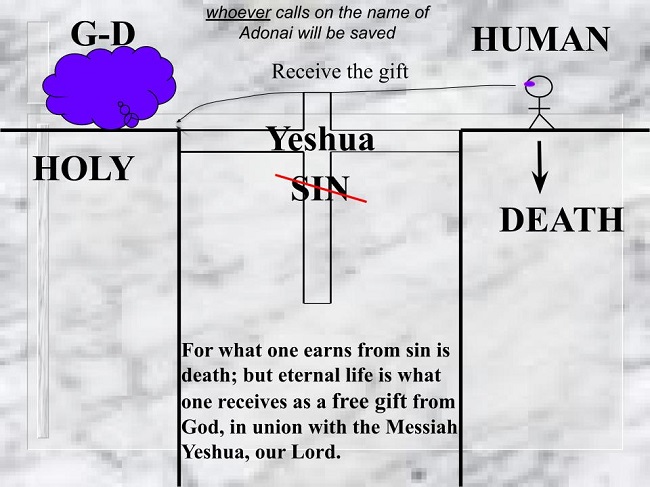
So how do we receive this gift? The Bible (Tanakh) says that:
whoever calls on the name of Adonai will be saved.
Joel 3:5
Call on the Lord
Notice that this promise is for ‘whoever’. Since he rose from the dead Yeshua is alive even now and he is ‘Lord’. So if you call on him he will hear and give his gift to you. You call out to him and ask him – by having a conversation with him. Perhaps you have never done this. Below is a prayer that can guide you. It is not a magic chant. The specific words used do not give it power. It is the trust like Abraham (Avraham) had that we place in him to give us this gift. As we trust him He will hear us and answer. The Gospel is powerful, and yet also so simple. Feel free to follow this guide if you find it helpful.
Dear Yeshua. I understand that with my sins I am separated from G-d. Though I can try hard, no effort and sacrifice on my part will bridge this separation. But I understand that your death was a sacrifice to wash away all my sins. I believe that you rose from the dead after your sacrifice so I know that your sacrifice was sufficient. I ask you to please cleanse me from my sins and bridge me to G-d so I can have eternal life. And I do not want to live a life enslaved to sin so please free me from sin. Thank you, Yeshua, for doing all this for me and would you even now continue to guide me in my life so I can follow you as my Lord.
Postscript
The korbanot sacrifices instituted under Moses (Moshe) ran for about 1500 years. Then about 40 years after Yeshua’s sacrifice the Romans destroyed the Second Temple and the sacrifices ceased. They have not revived. It is as if in the cessation of those sacrifices the Sovereign Lord confirms to the nation the sufficiency of that one sacrifice in Yeshua and His unending gift to us through him.
- According to Josephus and the Gospel accounts, Yeshua was crucified on Passover/Pesach, but the Gospels also state it was the day before Sabbath/Shabbat (i.e. on Friday). Since the day in the week that Passover occurs changes from year to year, the possible years would be those in which Passover was on a Friday. In the 30’s CE the two possible years are 30 CE and 33 CE. ↩︎